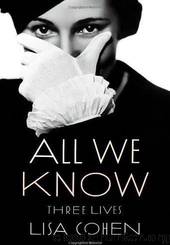All We Know: Three Lives by Lisa Cohen

Author:Lisa Cohen
Language: eng
Format: mobi, epub
Tags: Lesbians, Biography
ISBN: 9780374534486
Publisher: Farrar, Straus and Giroux
Published: 2013-09-10T05:00:00+00:00
The staff of British Vogue in the January 1, 1923, edition of Vogue. “Miss McHarg” is standing second from left, William Wood at center. Aldous Huxley is seated at left, Dorothy Wilde beside him. Ruth Anderson, interim editor, seated center (Courtesy Condé Nast Archive)
When Champco quit the magazine, Ruth Anderson became the interim editor; she, too, became a mentor and longtime friend. Aldous Huxley was on the staff in the early 1920s, writing book and theater reviews; Madge’s long friendship with him and Maria Huxley began at this time. Dorothy Wilde, Oscar’s niece, was also working on British Vogue. Constantly trying to improve herself, Madge pestered colleagues to train her, took secretarial classes at night (she enrolled in a school in South London, not the West End, to save money), and gradually worked her way up. She became a typist, then a secretary, then assistant to the editor. She also learned that how she looked gave her entrée. Even though her material circumstances were precarious, her clothes were still better than what “a tea girl” was expected to wear, and her shoes were pretty because vanity had made her stop wearing “the hideous laced-up surgical…boots” prescribed by the doctors. Delivering the proofs of a portrait to Elizabeth Bowes-Lyon, whose engagement to Prince Albert was announced in 1923 and duly noted in Vogue, Madge was let in the front door, instead of at the tradesmen’s entrance. To work in fashion in this way, it seemed, was not to be “in trade.” One day Huxley passed her on the stairs and asked, “Are you dressed like that because you’re on Vogue, or are you on Vogue because you’re dressed like that?” It was a conundrum about clothing, work, and identity that she liked to cite to suggest the indissolubility of these two options—and to describe her suitability, at once natural and hard-won, for the job.
But after two years of “walking about and working all day, and dancing most of the night, and eating very little,” she collapsed, diagnosed with jaundice and other ailments. Her parents, with whom she had had little communication, happened to be in London, and appeared at her bedside to chastise her. They had often discouraged her ambitions by reminding her of her bad health. “‘Oh you won’t be able to do this, that, and the other because you are so often ill,’” she said, mimicking them years later. Standing over her now, they told her this collapse was her reward for defying their wishes. Living on her own, too sick to work, with no income when she did not, she was frightened in a way that she had not been by relative penury and hunger. Ewart had remained in London after being demobilized and continued to be “on the outskirts” of her life during those years. He was perhaps in love with her, he certainly admired her, and he was inclined to be gallant. The family connection also created a sense of obligation. She cared for him, was
Download
This site does not store any files on its server. We only index and link to content provided by other sites. Please contact the content providers to delete copyright contents if any and email us, we'll remove relevant links or contents immediately.
| Actors & Entertainers | Artists, Architects & Photographers |
| Authors | Composers & Musicians |
| Dancers | Movie Directors |
| Television Performers | Theatre |
Cecilia; Or, Memoirs of an Heiress — Volume 3 by Fanny Burney(30950)
Cecilia; Or, Memoirs of an Heiress — Volume 2 by Fanny Burney(30907)
Fanny Burney by Claire Harman(25793)
We're Going to Need More Wine by Gabrielle Union(18088)
Plagued by Fire by Paul Hendrickson(16645)
Cat's cradle by Kurt Vonnegut(13898)
Bombshells: Glamour Girls of a Lifetime by Sullivan Steve(13120)
All the Missing Girls by Megan Miranda(12776)
Leonardo da Vinci by Walter Isaacson(11922)
4 3 2 1: A Novel by Paul Auster(11076)
Adultolescence by Gabbie Hanna(8154)
The remains of the day by Kazuo Ishiguro(7577)
Note to Self by Connor Franta(7031)
Diary of a Player by Brad Paisley(6872)
Giovanni's Room by James Baldwin(5896)
What Does This Button Do? by Bruce Dickinson(5536)
Recovery by Russell Brand(4574)
Born a Crime by Trevor Noah(4520)
The Kite Runner by Khaled Hosseini(4474)
